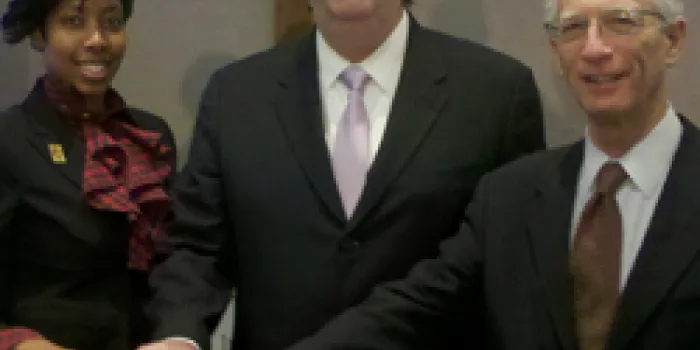HemAware “Takes 5” with people in the bleeding disorders community and spotlights their efforts with just five questions. Here, we talk with Ed Burke, 53, of Clearwater, Florida. Burke, who has severe hemophilia A, HIV and hepatitis C, has been appointed to a four-year term as the consumer chair of the US Department of Health and Human Services’ (HHS) Advisory Committee on Blood Safety and Availability. Burke is the director of advocacy and outreach/interstate sales for The Ethical Factor, a division of National Cornerstone Healthcare Services, Inc.
What is the purpose of this blood safety committee?
The committee was formed in 1997 out of recommendations from the Institute of Medicine to better monitor the blood supply and be more vigilant on blood safety issues. It covers everything on blood safety and availability, what legal and ethical issues come up about transfusions or transplantation safety, the economic factors—the cost of the product. But it is predominantly to monitor and detect pathogens, disease-causing organisms.
What are your role and responsibilities on the committee?
Most of the other committee members come from the blood banking industry and the pharmaceutical industry. I’m the consumer chair. Or, as I say, I’m the “end product.” The entire committee looks at potential threats to the blood supply, such as what parvoviruses, pathogens or prions are being discovered and on how HHS is addressing monitoring.
Why was it important for you to get involved with this committee?
I have hemophilia, and I seroconverted to HIV and hepatitis C. I’m a 25-year survivor, but I lost my younger brother, who also had hemophilia, to the AIDS epidemic because of contaminated product. As we learned, it didn’t have to happen; it shouldn’t have happened. After that, I vowed that I’d be an advocate for blood safety for the future—not just for people with hemophilia, but also for the blood supply for our country. I cared about making sure that something like this would never happen again.
I’ve been observing the meetings since 1997. There have been some really important issues—for example, legislation that would curtail monitoring. The hemophilia and bleeding disorders community wanted to make sure they knew we were there.
How did your own experience lead you into this advocacy work for blood supply safety?
When we found out in 1985—when an actual HIV test became available and both my brother and I tested positive—I got concerned. The National Hemophilia Foundation had just started a group called MANN (Men’s Advocacy Network of the NHF). It was men with hemophilia who had contracted HIV who were coming together to establish a way of support and education and to find out what happened. As it progressed, we found out people knew things and decided not to say things about HIV in the blood supply. If this committee had been around then, maybe we could have curtailed the HIV/AIDS epidemic.
It made me more aware that nobody was watching what was going on with the blood supply. Then members of the hemophilia community started dying—sometimes two a day—and my brother started getting sick. I just jumped in and got involved while I watched my brother get sicker and sicker. When he finally passed, I made a personal vow to do whatever I could so this didn’t happen again.
I receive wonderful support from my colleagues at Ethical Factor. They let me take the time from work to go to Washington and review a lot of information for the committee’s next meeting.
What are you most looking forward to with this new role?
As a person with hemophilia who has contracted two life-threatening diseases from failures by the blood collection agencies and the FDA, and witnessed the horrible death that my younger brother suffered, I am honored to represent the hemophilia community.
We are on the front lines of emerging threats, new prions and viruses. So I take this very seriously, because lives are at risk. We must maintain the most advanced technology to keep the blood supply safe. We do not know what new threats may be coming and, therefore, as a consumer, I will not hesitate to say “no” when industry decides profits over safety, as they did in the late 1970s and early 1980s. Their decision then was “since the evidence is inconclusive, we shall continue to sell,” and they distributed what turned out to be contaminated product that led to the deaths of thousands of people. We, the consumer had no say then. However, we do today. I will exercise my place on this committee to protect our community, as well as all Americans.
[Steps for Living: Blood Safety and Universal Data Collection]

